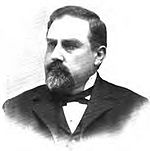Binger Hermann
| Binger Hermann | |
|---|---|
 |
|
| Member of the U.S. House of Representatives from Oregon's 1st district |
|
|
In office March 4, 1893 – March 3, 1897 June 1, 1903 – March 3, 1907 |
|
| Preceded by | Position created Thomas H. Tongue |
| Succeeded by |
Thomas H. Tongue Willis C. Hawley |
| Member of the U.S. House of Representatives from Oregon's At-large district |
|
|
In office March 4, 1885 – March 3, 1893 |
|
| Preceded by | Melvin Clark George |
| Succeeded by | Position replaced |
| Member of the Oregon Senate | |
|
In office 1868–1870 |
|
| Member of the Oregon House of Representatives | |
|
In office 1866–1868 |
|
| Personal details | |
| Born |
February 19, 1843 Lonaconing, Maryland |
| Died | April 15, 1926 (aged 83) Roseburg, Oregon |
| Political party | Republican |
Binger Hermann (February 19, 1843 – April 15, 1926) was an American attorney and politician in Oregon. A native of Maryland, he immigrated to the Oregon Territory with his parents as part of the Baltimore Colony. Hermann would serve in both houses of the Oregon Legislative Assembly and as a Republican in the United States Congress.
In 1904 Herman was caught up in the Oregon land fraud scandal and brought to trial for alleged land fraud. The jury failed to agree and Hermann was never retried. Hermann was posthumously exonerated by the administration of Franklin D. Roosevelt.
Hermann was born the eldest of eleven children in Lonaconing, Maryland, in 1843 to immigrant parents: Henry Hermann, a German-born physician, and Elizabeth Hopkins, an English immigrant. He graduated from the Independent Academy (later called Irving College) in Baltimore.
In the late 1850s, a group of Baltimore citizens, including Hermann's father, began to make plans to start a new life in the Oregon Territory. Dr. Hermann and his son met with Oregon's territorial delegate Joseph Lane to obtain letters addressed to prominent people already in Oregon who would assist the settlers. The younger Hermann wrote in his diary that he was fascinated by the politics and politicians his father brought him in contact with during that trip.
In April 1859, led by Dr. Hermann, seven families and several single men, known as the Baltimore Colony, left to build a new life in Oregon's Coquille Valley. The Hermanns chose a homestead on the South Fork of the Coquille River where Broadbent is now located, growing tobacco, sugar beets, flax seed, and raising honeybees. As Dr. Hermann found out information on Oregon's resources, he wrote articles for East Coast newspapers to inform other interested settlers.
...
Wikipedia
